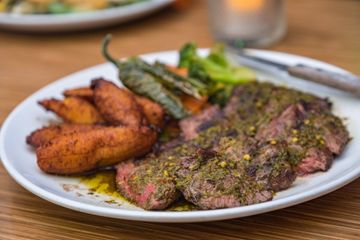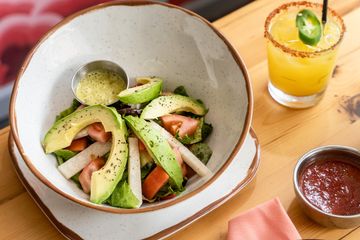Enjoy zesty hand crafted margarita blends that enhance your dining experience
Wiki Article
Is Mexican Food Healthy? Unloading the Nutritional Conveniences of Traditional Ingredients
The question of whether Mexican food is healthy and balanced invites an exploration of its typical active ingredients. Beans and corn act as foundational staples, abundant in protein and fiber. Avocados supply useful fats, while various natural herbs and spices include flavor and health and wellness benefits - take out and delivery. Together, these parts create a tapestry of nourishment. Nevertheless, the healthfulness of Mexican cuisine frequently relies on preparation techniques and section sizes. What role do these variables play in determining its total dietary value?The Power of Beans: Healthy Protein and Fiber-Rich Staples
Although usually forgotten, beans offer as a cornerstone of Mexican cuisine, supplying a wealth of nutritional advantages. Rich in healthy protein, they are an outstanding plant-based choice for those looking for to meet their dietary protein needs. This high protein web content sustains muscle repair and growth, making beans vital for both vegetarians and meat-eaters alike. Additionally, beans are an exceptional source of dietary fiber, which aids in digestion and promotes a feeling of volume, possibly assisting with weight management.The variety of beans made use of in Mexican dishes, such as black beans, pinto beans, and kidney beans, adds to a varied taste account and can boost dishes nutritionally. Beans are reduced in fat and contain essential vitamins and minerals, including magnesium, iron, and folate. Together, these features make beans a critical ingredient, providing both nutrition and food in typical Mexican fare.

Corn: a Versatile Grain With Nutritional Benefits
Corn attracts attention as a functional grain fundamental to Mexican food, celebrated not just for its cooking applications however likewise for its impressive dietary profile. As a key component in dishes like tortillas, tamales, and pozole, corn provides essential nutrients that add to a well balanced diet plan. Rich in carbs, it serves as a considerable energy resource, while additionally being low in fat, making it a desirable option for different nutritional needs.Corn is a good resource of nutritional fiber, which assists in digestion and promotes satiety. It has significant amounts of vitamins such as B-complex vitamins, which are crucial for basal metabolism. The visibility of antioxidants, particularly carotenoids, adds to overall health by lowering oxidative tension. Furthermore, corn is gluten-free, catering to those with gluten sensitivities. Overall, the nutritional advantages of corn highlight its value in traditional Mexican food and its role in a healthy diet.
Avocados: Healthy Fats and Nutrients in Every Bite
Avocados play a considerable role in Mexican cuisine, complementing meals with their creamy texture and abundant taste. Past their cooking allure, avocados are commemorated for their outstanding nutritional profile. They are an abundant resource of healthy and balanced monounsaturated fats, which can assist reduced bad cholesterol levels and support heart health and wellness. Furthermore, avocados are packed with vital minerals and vitamins, including potassium, vitamin E, and B vitamins, adding to general wellness.The high fiber content in avocados aids digestion and promotes satiety, making them a useful addition to any dish. Their one-of-a-kind nutrient structure can additionally support skin health and offer anti-inflammatory benefits. Including avocados right into typical Mexican recipes or enjoying them as a standalone snack can boost both taste and nutrition, showing why they are a precious staple in Mexican cuisine. On the whole, avocados supply a tasty way to enjoy healthy and balanced fats and important nutrients in every bite.

Flavors and Natural Herbs: Flavorful Health Boosters
While taking pleasure in the rich flavors of Mexican cuisine, one can not forget the vital duty that spices and herbs play in improving both taste and health and wellness. Ingredients such as oregano, cilantro, and chili peppers not just add to the dynamic taste account however additionally provide significant health and wellness advantages. For example, cilantro is known for its purifying residential or commercial properties, assisting to remove hefty steels from the body, while oregano is packed with antioxidants and possesses anti-inflammatory impacts.Chili peppers, a staple in several Mexican dishes, include capsaicin, which has been linked to enhanced metabolic rate and discomfort alleviation. In addition, seasonings like cumin and coriander assistance food digestion and might assist in blood sugar level law. Including these tasty health boosters into dishes not only boosts the culinary experience but likewise advertises total health, making Mexican food not simply scrumptious, yet additionally nutritionally advantageous.
Standard Food Preparation Techniques: Enhancing Nutrition and Flavor
Standard cooking approaches in Mexican food play a vital function in enhancing both nutrition and taste, as they often focus on classic methods and fresh ingredients. Strategies such as nixtamalization, where corn is saturated and cooked in an alkaline solution, not only like this boost the nutrient account of tortillas however also boost their digestibility - take out and delivery. Additionally, using slow-moving cooking methods, like cooking or braising, enables flavors to fuse wonderfully while keeping the honesty of the componentsFrequently Asked Questions
Are Mexican Food Portions Generally Larger Than Other Foods?
Mexican food portions are typically larger than those of lots of other foods. This characteristic reflects typical eating methods, highlighting communal sharing and hearty dishes, which can cause a more significant offering size overall.
How Does the Prep Work Technique Affect Healthiness of Mexican Food?
Prep work techniques considerably influence the healthfulness of Mexican food. Methods such as grilling or steaming protect nutrients, while frying can raise harmful fat material. Selections of components and cooking styles inevitably identify total nutritional value.Can Mexican Food Be Customized for Particular Nutritional Limitations?
Mexican food can indeed be customized for particular nutritional restrictions. Substitutions, such as using corn tortillas for gluten-free diet regimens or integrating more vegetables, enable individuals to enjoy conventional flavors while suiting different nutritional needs.What Prevail Mistaken Beliefs Regarding Mexican Food and Health?
Common false impressions about Mexican food consist of the belief that it is inherently harmful, overly hot, and solely focused on fats. Actually, traditional meals often feature healthy active ingredients and can be customized to different nutritional demands.Are There Healthier Choices at Mexican Dining Establishments?
Much healthier alternatives at Mexican restaurants often include grilled meats, beans, and fresh vegetables. Selecting meals that stress entire active ingredients and avoiding heavy sauces can result in a much more healthy eating experience, advertising general health.The selection of beans made use of in Mexican meals, such as black beans, pinto beans, and kidney beans, adds to a varied taste account and can improve dishes nutritionally. Avocados play a substantial duty in Mexican food, matching dishes with their creamy texture and rich flavor. my sources Including avocados right into typical Mexican recipes or enjoying them as a standalone snack can improve both flavor and nourishment, showing why they are a beloved staple in Mexican food. While enjoying the rich tastes of Mexican cuisine, one can not neglect the important function that spices and herbs play in enhancing both preference and wellness. Standard cooking approaches in Mexican cuisine play a vital function in enhancing both nourishment and taste, as they typically prioritize time-honored strategies and fresh active ingredients.
Report this wiki page